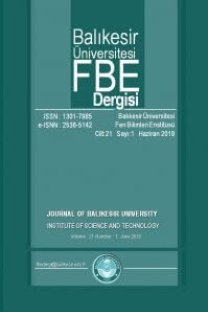First Robotik Yarışması (FRC) Türkiye katılımcılarının FRC algılarının metaforlar yardımıyla incelenmesi ve özgün bir zihin haritası oluşturulması
Determination of Turkish First Robotics Competition (FRC) participants’ perceptions towards FRC via metaphors and construction of a novel mind map
___
- FIRST, Vision and mission, (2019). https://www.firstinspires.org/about/vision-and-mission, (05.01.2019).
- Johnson, R. T. and Londt, S. E., Robotics competitions the choice is up to you!, Robotics, January, 16-20, (2010).
- Jackson, J., An engineering mentor’s take on first robotics, Robotics, March, 13-15, (2013).
- FIRST, What is robotics competition?, (2019). https://www.firstinspires.org/robotics/frc/what-is-first-robotics-competition, (05.01.2019).
- Melchior, A., Cohen, F., Cutter, T. and Leavitt, T., More than robots: an evaluation of the first robotics competition participant and institutional impacts, Technical report, Brandeis University, MA, (2005).
- Welch, A. G., The effect of the first robotics competition on high school students’ attitudes toward science, Unpublished PhD Thesis,University of Kansas, USA, (2007).
- FIRST, At a glance, https://www.google.com/url?q=https://www.firstinspires.org/about/at-a-glance&sa=D&ust=1549819559164000&usg=AFQjCNHzZ9pn2OpmVNWZ4-1EM1CftBPLBg, Accessed 05 Januray 2019, (2019).
- FYF, Presentations, (2019). https://www.fikretyukselfoundation.org/en/presentations/ (05.01.2019).
- FIRST, FRC blog, (2018). https://www.firstinspires.org/robotics/frc/blog/2019-mht-kickoff-turkey-regional, (05.01.2019).
- Oppliger, D., University - pre college interaction through first robotics competition. International Conference on Engineering Education, August 6-10, 2001 Oslo, Norway, (2011).
- Wilczynski, V. and Flowers, W., FIRST Robotics competition: university curriculum applications of mobile robots, International Journal of Engineering Education, 22(4), 792-803, (2006).
- Davis, C., Work in Progress - FIRST robotics competition from the perspective of a first time mentor, 39th ASEE/IEEE Frontiers in Education Conference, October 18 - 21, 2009, San Antonio, TX, (2009).
- Griffith, D. S., First robotics as a model for experiential problem-based learning: a comparison of student attitudes and interests in science, mathematics, engineering, and technology, PhD Thesis, Clemson University, USA, (2005).
- Welch, A. and Huffman, D., The Effect of robotics competitions on high school students’ attitudes toward science, School Science and Mathematics, 111(8), 416-424, (2011).
- Barker, B. S. and Ansorge, J., Robotics as means to increase achievement scores in an informal learning environment, Journal of Research on Technology in Education, 39(3), 229-243, (2007).
- Barak, M. and Zadok, Y., Robotics projects and learning concepts in science, technology and problem solving, International Journal of Technology and Design Education, 19, 289–307, (2009).
- Nugent, G., Barker, B., Grandgenett, N. and Adamchuk, V. I., Impact of robotics and geospatial technology interventions on youth stem learning and attitudes, Journal of Research on Technology in Education, 42(4), 391-408, (2010).
- Whitehead, S. H., Relationship of robotic implementation on changes in middle school students’ beliefs and interest toward science, technology, engineering and mathematics. PhD thesis, Indiana University of Pennsylvania, (2011).
- Jaipal-Jamani, K. and Charoula Angeli, C., Effect of robotics on elementary preservice teachers’ self-efficacy, science learning, and computational thinking, Journal of Science Education and Technology, 26, 175–192, (2017).
- Bezuidenhout, A., Metaphor and what is said: a defense of a direct expression view of metaphor, Midwest Studies in Philosophy, XXV, 156-186, (2001).
- Koç, M., Student teachers’ conceptions of technology: A metaphor analysis, Computers & Education, 68, 1–8, (2013).
- Gök, B. and Erdoğan, T., Investigation of pre-service teachers’ perceptions about concept of technology through metaphor analysis, TOJET: The Turkish Online Journal of Educational Technology, 9 (2), 145-160, (2010).
- Karadeniz, Ş., School administrators, ict coordinators and teachers’ metaphorical conceptualizations of technology, Education, 2(5), 101-111, (2012).
- Kurt, A. A. and Özer, Ö., Metaphorical perceptions of technology: case of Anadolu University teacher training certificate program, Journal of Theory and Practice in Education, 9(2), 94-112, (2013).
- Christidou, V., Dimopoulos, K. and Koulaidis, V., Constructing social representations of science and technology: the role of metaphors in the press and the popular scientific magazines, Public Understanding of Science, 13, 347–362, (2004).
- Dhindsa, H. S., Kasim, M. and Anderson, O. R., Constructivist-visual mind map teaching approach and the quality of students’ cognitive structures, Journal of Science Education and Technology, 20, 186–200, (2011).
- Budd, J. W., Mind maps as classroom exercises, The Journal of Economic Education, 35(1), 35-46, (2004).
- Yıldırım, A. and Şimşek, H., Sosyal bilimlerde nitel araştırma yöntemleri [Qualiative research methods in social sciences] (6th Ed.), Ankara: Seçkin Yayıncılık, (2008).
- Saban, A., Öğretmen adaylarının öğrenci kavramına ilişkin sahip oldukları zihinsel imgeler [Metaphorical images of prospective teachers related to the concept of student], Türk Eğitim Bilimleri Dergisi [The Journal of Turkish Educational Sciences], 7(2), 281-326, (2009).
- Saban, A., Okula ilişkin metaforlar [Metaphors about school], Kuram ve Uygulamada Eğitim Yönetimi [Educational Administration: Theory and Practice], 55, 459-486, (2008).
- Saban, A., Koçbeker, B. N. and Saban, A., An investigation of the concept of teacher among prospective teachers through metaphor analysis, Educational Sciences: Theory & Practice, 6(2), 509-522, (2006).
- Maslow, A. H., A theory of human motivation, Psychological Review, 50(4), 370-396, (1943).
- ISSN: 1301-7985
- Yayın Aralığı: 2
- Başlangıç: 1999
- Yayıncı: Balıkesir Üniversitesi
Ssap-NtrB prokaryotik geninin ökaryotik ekspresyon vektörü pcDNA3.1 / V5 / His B içine klonlanması
Enes Arda ÖZGÜR, Handan ÜREK, Fikrican ÖZGÜR
Denetimsiz eşdüzey kavşakların performans analizi: Aydın örneği
Cenk OZAN, Özgür BAŞKAN, Mehmet Metin , , Https://orcid.org/0000-0003-0008-8279 MUTLU
Işın tabanlı modellerle en uygun radyo istasyon yeri kestirimi
Kısmi rastgeleleştirilmiş yanıt modellerinde yeni bir regresyon tahmin edicisi
Meke Maarı (Konya) civarının herpetofaunası
Kamil CANDAN, Elif YILDIRIM CAYNAK, Yusuf KUMLUTAŞ, Özlem ÖZENDER, Çetin ILGAZ
Birinci dereceden tüm maksimal akretif diferansiyel operatörlerin gösterimi
